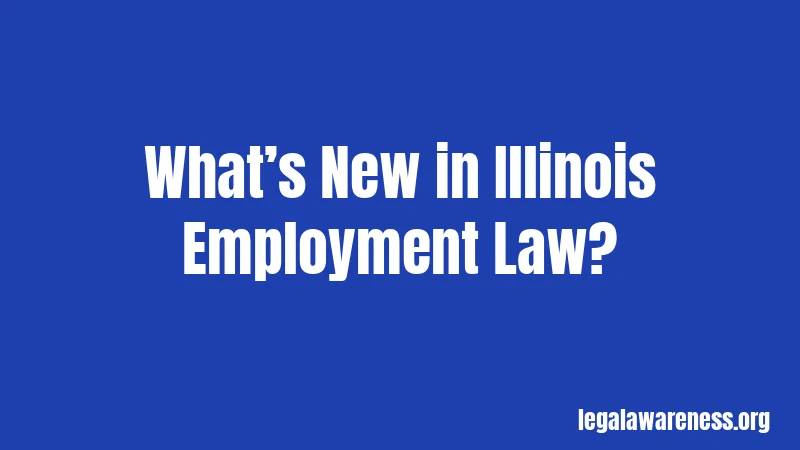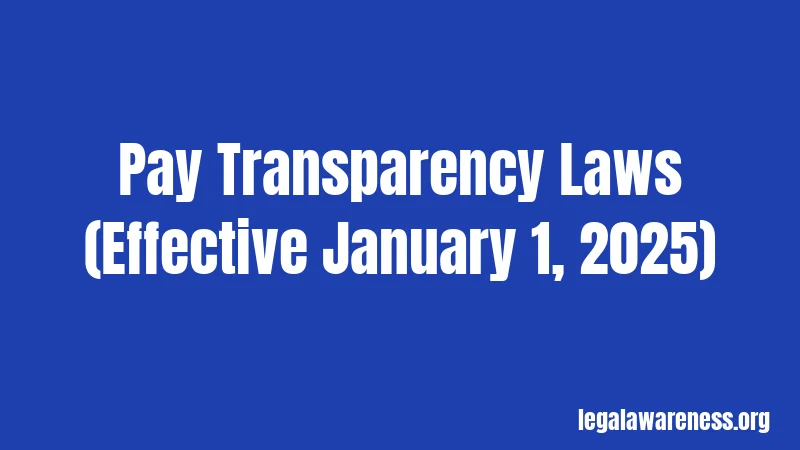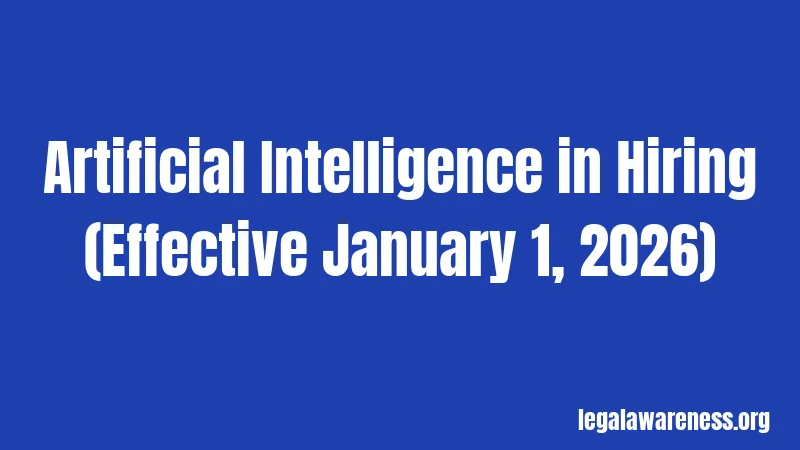Illinois Employment Laws in 2026: Major Changes Every Worker Should Know
Most people don’t realize how much Illinois employment law changed recently. Seriously. In the past year alone, the state passed major updates to minimum wage, pay transparency, family leave, and AI use in hiring. These aren’t small tweaks. They’re significant protections that affect millions of workers across Illinois.
Here’s the deal. Whether you’re an employee or an employer, understanding these laws matters. Let’s break down exactly what changed and what you need to know.
What’s New in Illinois Employment Law?

Illinois has been busy updating its worker protections. Governor Pritzker signed multiple bills throughout 2025 that take effect in 2026. These laws cover everything from how much you get paid to whether your boss can use artificial intelligence to screen your job application.
The changes are designed to close wage gaps, increase transparency, and protect workers’ rights. They also respond to new technologies and modern workplace needs.
Minimum Wage Requirements
The Illinois minimum wage is $15.00 per hour as of 2025. That rate stays the same in 2026. Workers age 18 and older get the full minimum wage. There are no more scheduled increases after 2025 unless the legislature passes new laws.
Not everyone gets the full $15.00 though. Here are the exceptions.
Youth Workers
Workers under 18 can be paid $13.00 per hour if they work less than 650 hours per year with one employer. Once they hit 650 hours, they must get the full $15.00. This applies to each calendar year.
Tipped Employees
Tipped workers must receive at least $9.00 per hour. Employers can take a tip credit of up to 40% of the minimum wage. But if tips plus wages don’t add up to $15.00, the employer has to make up the difference.
Training Wages
Employers can pay $14.50 per hour for the first 90 days of employment. This applies only to workers over 18 who don’t receive tips.
Overtime Rules
Pretty straightforward. You get time and a half after 40 hours in a workweek. This applies to most employees unless you’re in an executive, administrative, or professional role that meets specific salary requirements.
Pay Transparency Laws (Effective January 1, 2025)

Hold on, this part is important. Illinois now requires employers with 15 or more employees to include pay ranges in job postings. This law took effect on January 1, 2025.
What Employers Must Disclose
Job postings must include the wage or salary range and a general description of benefits. This includes bonuses, stock options, health insurance, retirement benefits, and other compensation.
The pay range has to be what the employer reasonably expects to offer in good faith. You can’t just post “$40,000 and up” or “up to $60,000.” That’s not allowed.
Which Jobs Are Covered?
The law applies to positions that will be performed at least partly in Illinois. It also covers jobs performed outside Illinois if the worker reports to a supervisor or office in Illinois.
Wondering if this applies to you? If you work for a company with 15 or more employees anywhere in the world, and your job connects to Illinois, the answer is probably yes.
Promotional Opportunities
Here’s something most people miss. Employers must notify current employees about promotional opportunities within 14 days of posting them externally. This gives existing workers a fair shot at advancement.
Penalties for Non-Compliance
For active job postings, penalties increase with each violation. First offense gets a 14-day cure period and a fine up to $500. Second offense gets seven days and up to $2,500. Third offense? No cure period and up to $10,000.
The Illinois Department of Labor doesn’t mess around after the third violation. You enter a five-year period where any future violations automatically trigger $10,000 fines without a chance to fix it.
Family and Medical Leave Updates
Illinois expanded several leave laws in 2025 that take effect in 2026. Let’s talk about the biggest ones.
Neonatal Intensive Care Leave (Effective June 1, 2026)
This one’s new. The Family Neonatal Intensive Care Leave Act provides unpaid leave when your newborn is in the NICU.
Employers with 16 to 50 employees must provide up to 10 days of leave. Employers with 51 or more employees must provide up to 20 days. The leave is job-protected, meaning you can’t be fired for taking it.
You can take this leave while your child is hospitalized in the NICU. Employers can ask for reasonable documentation but can’t request anything protected by HIPAA.
Blood and Organ Donation Leave
Part-time employees can now take time off to donate organs. Previously, this benefit was only for full-time workers.
Employees can take up to 10 days within a 12-month period to serve as organ donors. For part-time employees, employers calculate pay based on the employee’s average daily pay over the prior two months.
Nursing Mothers in the Workplace
Employers must provide paid break time for employees to express breast milk for one year after childbirth. These breaks run concurrently with existing break periods when possible.
But here’s the key change. Employers cannot require employees to use paid leave during this break time. They also can’t reduce compensation.
The only exception? If providing the breaks would cause an “undue hardship” as defined by the Illinois Human Rights Act. That’s a high bar to meet.
Military Leave for Funeral Honors
The Military Leave Act now provides up to 8 hours of paid leave per month for employees to participate in funeral honors detail. That’s up to 40 hours per calendar year.
This applies to employers with 51 or more employees. Employees must work at least 1,250 hours in the prior 12 months to qualify.
Artificial Intelligence in Hiring (Effective January 1, 2026)

Okay, this one’s interesting. Illinois now prohibits employers from using AI in hiring decisions if it results in discrimination.
What Counts as AI?
The law defines AI broadly. It includes any machine-based system that generates predictions, content, recommendations, or decisions that can influence employment.
This covers recruitment, hiring, promotion, selection for training, discharge, discipline, and other employment decisions.
Prohibited Practices
Employers cannot use AI that discriminates based on protected classes. They also cannot use zip codes as a proxy for race, ethnicity, or other protected characteristics.
Sound complicated? It’s actually not. The law basically says you can’t use technology to do what would be illegal if a human did it.
Required Disclosures
Employers using AI in employment decisions must disclose this to employees and applicants. The law doesn’t specify exactly how to notify people, but you need to tell them.
Most people don’t realize how strict these laws are. The Illinois Department of Human Rights is expected to provide more guidance on compliance.
Penalties
Civil penalties start at $16,000 and go up. These penalties vindicate the public interest, meaning they’re meant to deter bad behavior.
Workplace Transparency Requirements
The Illinois Workplace Transparency Act got major updates in 2025. Here’s what changed.
Broader Protections for Concerted Activity
Employers can’t restrict employees from engaging in concerted activity to address work-related issues. Previously, the law only prohibited restrictions on reporting unlawful conduct.
Now it covers any agreement that limits workers’ ability to discuss workplace concerns together. This is a big expansion.
Expanded Definition of Unlawful Practices
“Unlawful employment practice” now includes any act prohibited by the Illinois Human Rights Act, Title VII of the Civil Rights Act, and other state or federal employment laws.
It’s not just about discrimination and harassment anymore. The definition is much broader.
VESSA Protections
The Victims’ Economic Security and Safety Act was expanded again. Workers can now use work-issued devices to record violence they or their household members experience.
Employers cannot restrict or remove device usage solely because it was used to document violence. This protects victims while they’re gathering evidence.
Workers’ Rights and Safety Act (Effective January 1, 2026)
Here’s where it gets serious. Illinois passed a law to protect federal worker safety standards.
Freezing Federal Protections
If federal OSHA standards are repealed or weakened after April 28, 2025, Illinois will adopt equivalent state standards. This preserves worker safety protections even if federal laws change.
The Illinois Department of Labor must adopt these standards as soon as practical. State agencies also cannot reduce current protections below 2025 federal levels.
Basically, Illinois is saying worker safety isn’t negotiable. Federal changes won’t weaken state protections.
Illinois Human Rights Act Changes
Several amendments to the Illinois Human Rights Act take effect in 2026.
Discretionary Fact-Finding Conferences
Fact-finding conferences for discrimination charges are now optional instead of mandatory. Previously, the Illinois Department of Human Rights held detailed meetings for every open charge.
Now both parties must submit a joint written request within 90 days of filing to get a conference. This speeds up the investigation process for some cases.
Increased Civil Penalties
Civil penalties can now reach $16,000 and higher. These penalties are in addition to other remedies like back pay or reinstatement.
The Illinois Human Rights Commission or a three-member panel can issue these penalties based on recommendations from hearing officers.
Workers’ Compensation Requirements
Almost all Illinois employers must carry workers’ compensation insurance. This includes employers with just one employee.
Who Needs Coverage?
You need coverage from the moment you hire your first employee. This applies even if the hire was made in Illinois but the work is performed elsewhere.
All business types must comply. Corporations, partnerships, sole proprietors, and LLCs all need coverage.
What’s Covered?
Workers’ comp covers injuries that arise out of and in the course of employment. This includes traumatic injuries, repetitive stress injuries, and occupational diseases.
Mental health conditions caused by work-related stress can also be covered in some circumstances.
Penalties for Non-Compliance
Not having workers’ comp insurance is a big deal. Negligently failing to carry coverage is a Class A misdemeanor. Each day without coverage is a separate offense.
Knowingly failing to maintain coverage is a Class 4 felony. That’s up to three years in prison and a $25,000 fine per day.
Employers also face civil penalties of $500 per day without coverage. They lose all legal defenses and can be sued directly in civil court.
Employee Protections
Workers whose employers lack coverage can file a claim with the Injured Workers’ Benefit Fund. They can also sue the employer directly for damages beyond workers’ comp benefits.
The law prohibits retaliation against workers who file claims. Employers cannot harass, discharge, or discriminate against employees for exercising their rights.
Child Labor Law Updates (Effective January 1, 2025)
Illinois completely rewrote its child labor law in 2024. The Child Labor Law of 2024 took effect on January 1, 2025.
Who’s Covered?
The law covers minors under 16 years of age. It’s designed to provide the greatest protection of a minor’s wellbeing.
Employment Certificates
Employers must obtain an employment certificate before hiring a minor. These certificates must be kept on the premises.
Work Hour Restrictions
Minors generally cannot work more than 18 hours during a school week or more than 40 hours when school is out. They can’t work more than 8 hours in any 24-hour period.
Night work is restricted too. From Labor Day to June 1, minors can’t work between 7 PM and 7 AM. From June 1 to Labor Day, the restriction is 9 PM to 7 AM.
On school days, minors can’t work more than 3 hours per day. The combined total of work and school hours can’t exceed 8 hours.
Privacy in the Workplace Act (Effective December 12, 2025)
This law became effective immediately when signed. It provides more protections for private and public employees.
Employers with company laptops and phones should update their policies. The law strengthens privacy protections around personal devices and employer-issued equipment.
How to Protect Your Rights
Don’t worry, we’ll break it down step by step. Here’s what you should do.
Know Your Rights
Read your employee handbook. Check what policies your employer has in place. Make sure they comply with current Illinois law.
You can find official information on the Illinois Department of Labor website. They provide posters and guides explaining worker rights.
Document Everything
Keep records of your pay stubs, work hours, and any workplace issues. If something seems wrong, write it down with dates and details.
This documentation helps if you ever need to file a complaint or claim.
Report Violations
If your employer violates Illinois employment law, you can file a complaint with the appropriate agency. The Illinois Department of Labor handles wage and hour issues, pay transparency, and some other complaints.
The Illinois Department of Human Rights handles discrimination, harassment, and retaliation claims.
Get Legal Help When Needed
Honestly, this is the part most people miss. Employment law is complicated. If you’re facing serious issues like wrongful termination, discrimination, or unpaid wages, talk to an employment lawyer.
Many lawyers offer free consultations. They can tell you if you have a case and what your options are.
What Employers Need to Do
If you’re an employer, here’s your action list.
Update Job Postings
Add pay ranges and benefits to all job postings if you have 15 or more employees. Make sure the ranges are realistic and in good faith.
Review all your templates and existing postings. Update them before January 1, 2026, if you haven’t already.
Review Your Policies
Check your employee handbook. Does it reflect the new leave laws? Does it address AI use in hiring? Does it protect nursing mothers?
Update policies for NICU leave, military funeral leave, and organ donation leave. Make sure you’re compliant before the effective dates.
Train Your Team
Make sure HR staff and managers understand the new requirements. They need to know about pay transparency, AI restrictions, and leave entitlements.
Training prevents violations and protects your business.
Maintain Proper Records
Keep job postings for at least five years. Document your pay scales and benefits. Maintain employment certificates for minors.
Good recordkeeping is essential for compliance.
Buy Workers’ Comp Insurance
If you don’t already have it, get it now. Even one employee triggers the requirement.
Work with a licensed insurance company or apply to self-insure through the Illinois Workers’ Compensation Commission.
Special Circumstances to Consider
A few situations deserve extra attention.
Remote Workers
If someone works remotely outside Illinois but reports to an Illinois supervisor, many of these laws still apply. Pay transparency requirements cover these positions.
Make sure you understand which laws apply to remote workers.
Third-Party Recruiters
If you use recruiters or employment agencies, you must provide them with pay and benefits information. They’re required to include it in job postings.
The third party can avoid liability only by proving you didn’t provide the necessary information.
Collective Bargaining Agreements
Most of these laws apply even if you have a union contract. Pay transparency requirements don’t exclude positions subject to collective bargaining agreements.
Check your CBA to make sure it doesn’t conflict with state law.
Multi-State Employers
If you operate in multiple states, make sure you comply with Illinois law for Illinois positions. Don’t assume your other states’ policies will work here.
Illinois often has stricter requirements than federal law or other states.
Frequently Asked Questions
What is Illinois’ minimum wage in 2026?
The minimum wage is $15.00 per hour for workers 18 and older. Tipped workers get $9.00. Workers under 18 working less than 650 hours per year get $13.00.
Do employers have to post salary ranges in job ads?
Yes, if they have 15 or more employees and the job connects to Illinois. They must include the wage or salary range plus benefits.
Can my employer use AI to screen my application?
They can, but they must disclose it and can’t use it in ways that discriminate. Using zip codes as a proxy for race is prohibited.
What leave can I take if my baby is in the NICU?
You get 10 days if your employer has 16 to 50 employees. You get 20 days if they have 51 or more. This is unpaid but job-protected.
Does Illinois require workers’ comp insurance?
Yes. Almost all employers need it, even with just one employee. Penalties for not having it include criminal charges and civil fines.
Final Thoughts
Now you know the basics. Illinois employment law changed significantly in 2025 and 2026. These changes protect workers through higher transparency, better leave options, and stronger safety standards.
Whether you’re an employee understanding your rights or an employer staying compliant, these laws matter. Keep this guide handy. Refer back to it when questions come up.
And when in doubt? Look it up, ask the Illinois Department of Labor, or talk to an employment lawyer. Your rights and your business are worth protecting.
References
- Illinois Department of Labor – Minimum Wage Law
- Illinois Equal Pay Act – Salary Transparency
- Illinois Workers’ Compensation Commission
- Illinois Compiled Statutes – Workers’ Compensation Act
- Illinois Department of Labor – Pay Transparency Law
- DLA Piper – New Laws for Illinois Employers 2025
- Jackson Lewis – Illinois 2025 Employment Law Updates
